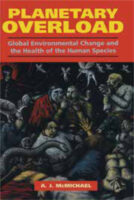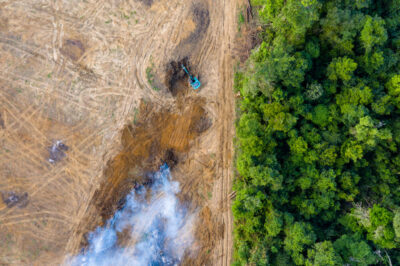Main content
Antony J. McMichael (1993)
Planetary Overload: Global Environmental Change and the Health of the Human Species
Cambridge University Press
Number of pages: 352
Price: € 51,99

Although published in 1993, Planetary Overload could have been written yesterday. The statistics may be somewhat obsolete but its message certainly is not. Could humans really become ‘an endangered species’? It may sound like science fiction, but this resourceful, intelligent book describes how this actually could become reality if we continue to damage ecosystems with overpopulation, the spread of technology, and our conspicuous consumption – trends which since the publication of this book have only intensified – and continue to disrupt the subtle balance between human populations and our life-support systems. Thereby steadily overloading our Earth’s capacity to absorb, replenish and repair.
Planetary Overload has three parts, with the first four chapters discussing the nature of the problems posed by ecological disruption, and presenting the possible impact of environmental changes on human health. The second part is what McMichael refers to as the ‘meat of the book’, in which he reviews the underlying problem of excessive population growth. This is followed by five chapters exploring the origins of ecological disruption: climate change, stratospheric ozone depletion, land degradation and the impairment of food production, loss of biodiversity, and the burgeoning growth of cities. The final three chapters place these phenomena in a broader social context, exploring our impediments to addressing the root causes of macro-ecological problems and the inequalities of wealth, trade and influence. Readers are challenged to reflect on the limitations of neoclassical economics, the effect of structural adjustment programmes (cutting government expenditure in ‘non-productive areas’), how we can reconcile economy with ecology, and what we mean by growth and development in light of the impact of these processes on human health.
The final chapter presents ways to address the systemic causes of environmental problems in today’s world: massive population growth; third world poverty and a festering burden of debt of poor countries; non-sustainable consumption and biosphere-damaging waste generation in rich countries; widespread non-sustainable agricultural practices; and the environmentally damaging industrialisation and exploitation of natural resources in poor countries struggling to increase export earnings. McMichael’s list is long and although the magnitude of the problems is overwhelming, he does offer some hope. Planetary Overload is skilfully written, though not always an easy read, as the book is packed with data, figures and statistics. On the other hand, according to the author himself ‘what is most important here is not factual detail, but the overall import of the analysis and argument’.
Humans are relative newcomers: we have walked on our planet’s surface for less than one ten-thousandth of Earth’s lifespan. We really are newcomers, with no special immunity against the usual fate of biological species on Earth: extinction. Wisdom comes with experience and age, and the capacity to learn from past mistakes. Planetary Overload is a compelling invitation to prove our name right, Homo sapiens (wise), and to start learning the lessons that are staring us in the face.



















































